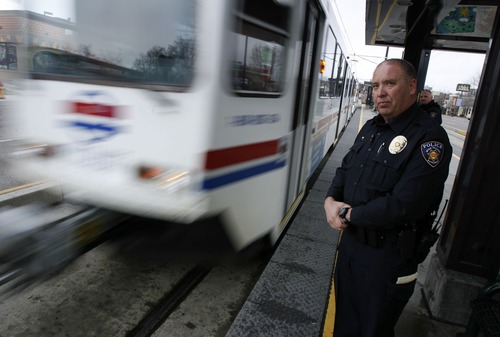This is an archived article that was published on sltrib.com in 2013, and information in the article may be outdated. It is provided only for personal research purposes and may not be reprinted.
Several Utah Transit Authority board members worry that its police force essentially may be an expensive, well-armed customer service agency, or fare enforcement squad.
So they said Wednesday that it may make sense to have police focus on the serious enforcement that only they can perform, and have less-expensive workers handle such things as helping customers navigate its system. Or it may make sense to save money by disbanding its force to contract with others for essential policing.
That led the UTA board's Finance & Operations Committee to decide Wednesday that before possibly disbanding the UTA Police, it first should figure out what it wants police to do — or avoid.
"Does it make sense to have a uniformed officer with a gun kind of being our No. 1 customer-service face?" asked committee chairman Chris Bleak. "Is that what we want certified officers doing?"
The group decided to send a written poll to UTA board members asking what services UTA policing should focus on. Bleak said results may then be used to design and seek proposals from other agencies such as the Unified Police Department or Utah Highway Patrol — or retain and perhaps reshape UTA Police.
Board member Troy Walker has been pushing UTA to consider contracting with other police agencies to save money. The UTA Police has an annual budget of $5.4 million, with 60 sworn officers, 18 security guards and four civilian administrators.
"We tried not to have our own police force when we got started," UTA General Manager Michael Allegra said. But he added that the agency found with fare enforcement, for example, that using armed uniformed officers reduced confrontations — and made other passengers feel safer.
Board member David Burton, the former LDS Church presiding bishop, said UTA also should consider whether riders might feel even more safe if police from other agencies — who may be more familiar than transit officers — were enforcing laws on trains.
Some board members noted the UTA's 60 officers cannot cover all trains (bus fares are enforced by drivers) during the long hours UTA operates, and wanted to know how much fare enforcement occurs — and if it would be wise to expand it with less-expensive types of workers.
UTA Chief Safety Officer Dave Goeres, who oversees UTA Police, said officers now check about 2 percent of train riders a month for tickets — and they focus mostly on areas known to have problems. Of the people checked, about 2.5 percent are violators — a rate he said is within typical ranges nationally.
Allegra said UTA has relatively few ticket violators because most riders use monthly passes from schools or employers. Walker questioned whether it makes sense to spend money on police for fare enforcement in that situation.
Goeres said the top priority of UTA Police now is customer service, and said that is something that could be lost by contracting with another agency. But Bleak said he feels "that doesn't align well with what we want a police force to be doing."
The committee is also considering asking other agencies about their overall unit costs — including pay, benefits, training and support — to provide an officer for an eight-hour day, and compare the expense.
Board member Robert Hunter said he has heard that "people quit other police departments to work for UTA because they pay so damn much," so he'd like to see a comparison "just to answer that question."
Goeres, meanwhile, urged members to look at why some transit agencies nationwide that had contracted for service are moving to create their own police departments. He said they found that city police often do not put a high priority on activities that could disrupt transit, such as unsafe crossing of tracks or being disruptive on a train.



